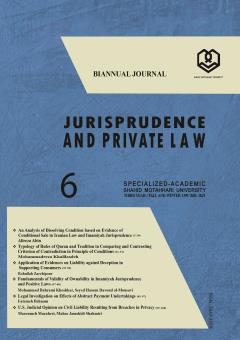-
-
-
Open Access Article
1 - Mortgage of Jointly Owned Property in the Jurisprudence of Five Religious Schools of Law and in Iranian Law
Saeed FarsadAbstract: Mortgage of jointly owned property (indivisum) is permissible according to Imamiyah, Maliki, Shafi’i, and Hanbali (except Hanafi) schools of Law because it is an instance of the rule of dominion. This is because conclusion of the mortgage contract does not mea MoreAbstract: Mortgage of jointly owned property (indivisum) is permissible according to Imamiyah, Maliki, Shafi’i, and Hanbali (except Hanafi) schools of Law because it is an instance of the rule of dominion. This is because conclusion of the mortgage contract does not mean possession of the jointly owned property. It is clear that submission of the jointly owned property to the mortgagee, in cases where it requires possession of the shares of the other partners, requires obtaining their consent. In cases where the mortgager submits the property to the mortgagee without the consent of the other partners, he shall be considered legally responsible for that. However, in cases where the submission of property means evacuation, the submission of the property does not mean possession of the shares of other partners, thus according to the jurisprudence of the above-said schools of law it does not need their consent for evacuation. This paper intends to study these issues in the jurisprudence of the abovementioned five schools of law and in the Iranian law. Manuscript profile -
Open Access Article
2 - Fundamentals of Validity of Ownability in Imamiyah Jurisprudence and Positive Laws
Mohammad Mohammad Baramai سيدحسن داودالموسویUnderstanding the fundamentals of ownability of a property is important in distinguishing property from non-property. Since jurists of Imamiyah jurisprudence have no consensus on definition of ownability of a property and the Civil Law has not specified what the proper MoreUnderstanding the fundamentals of ownability of a property is important in distinguishing property from non-property. Since jurists of Imamiyah jurisprudence have no consensus on definition of ownability of a property and the Civil Law has not specified what the property is by definition, the importance of understanding the fundamentals of ownability of a property has further come to light. This paper intends to find a unified criterion for validity of ownability of a property, analyze the criteria set by the jurists, and investigate the strengths and weak points of the expressed criteria. The criterion thus achieved helps distinguishing property from non-property in doubtful cases. Such power of distinction helps us in various issues since ownability is a matter of credibility and the right understanding of ownability and its attachments depends upon acquiring knowledge on credit concepts and its specifications. Therefore, this paper points to some instances of credits. The author of this paper is of the opinion that the major criterion for understanding ownability is the rational approach toward this subject and other criteria expressed are either problematic or abundant. The paper has finally discussed available solutions in case doubts appear in conventional and legal ownability of a property. Manuscript profile
List of Articles Imamiyah
-
The rights to this website are owned by the Raimag Press Management System.
Copyright © 2017-2024


